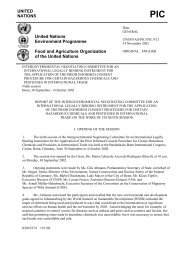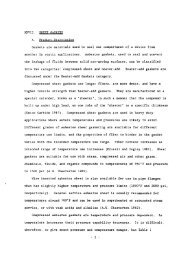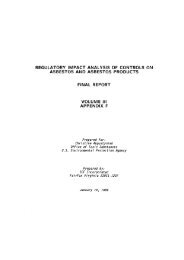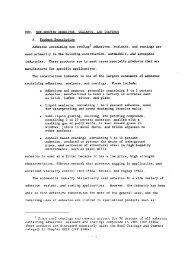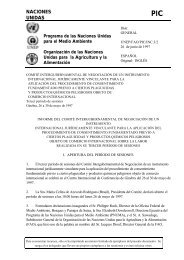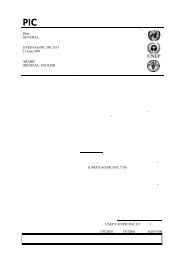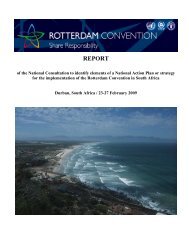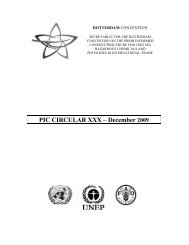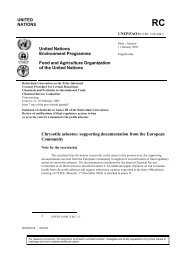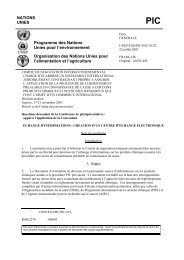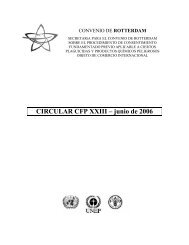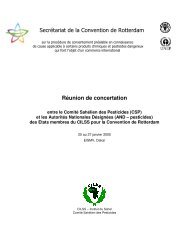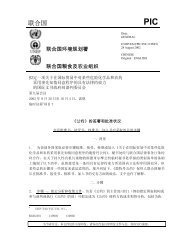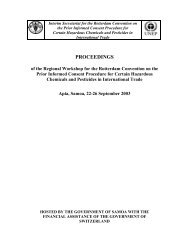Rep o rt of th e tw en - Rotterdam Convention
Rep o rt of th e tw en - Rotterdam Convention
Rep o rt of th e tw en - Rotterdam Convention
Create successful ePaper yourself
Turn your PDF publications into a flip-book with our unique Google optimized e-Paper software.
Singapore, UNEP and WHO, repres<strong>en</strong>tatives from CropLife and PANAP, as observers, and resource<br />
persons from FAO, Rome.<br />
The pa<strong>rt</strong>icipants discussed, how best <strong>th</strong>e new provisions <strong>of</strong> <strong>th</strong>e Code <strong>of</strong> Conduct, revised in<br />
2002, be used to str<strong>en</strong>g<strong>th</strong><strong>en</strong> its guidance to reduce <strong>th</strong>e adverse effects <strong>of</strong> pesticides on heal<strong>th</strong> and<br />
<strong>th</strong>e <strong>en</strong>vironm<strong>en</strong>t and to suppo<strong>rt</strong> sustainable agricultural practices. They assessed <strong>th</strong>e status <strong>of</strong><br />
implem<strong>en</strong>tation <strong>of</strong> <strong>th</strong>e revised Code at <strong>th</strong>e country level and id<strong>en</strong>tified needs, priorities and emerging<br />
issues. They also discussed <strong>th</strong>e implications <strong>of</strong> <strong>th</strong>ose new provisions <strong>of</strong> pesticide managem<strong>en</strong>t in<br />
respective countries. Pa<strong>rt</strong>icipants shared <strong>th</strong>e information on <strong>th</strong>e status <strong>of</strong> observance <strong>of</strong> <strong>th</strong>e Code in<br />
Asia and jointly developed mechanisms for improved monitoring, collaboration and information<br />
exchange.<br />
The workshop recognized <strong>th</strong>at all countries in <strong>th</strong>e Asia region are committed to implem<strong>en</strong>ting<br />
<strong>th</strong>e Code and have made significant progress in promoting <strong>th</strong>e judicious and responsible use <strong>of</strong><br />
pesticides in suppo<strong>rt</strong> <strong>of</strong> sustainable agricultural developm<strong>en</strong>t and improved public heal<strong>th</strong>. It was<br />
noted <strong>th</strong>at all countries have passed national legislation to regulate <strong>th</strong>e use <strong>of</strong> pesticides and have<br />
established institutions to register <strong>th</strong>e products used in <strong>th</strong>e respective countries. Products <strong>th</strong>at are<br />
highly hazardous to <strong>th</strong>e user, consumer or <strong>th</strong>e <strong>en</strong>vironm<strong>en</strong>t have be<strong>en</strong> banned or severely restricted.<br />
All countries suppo<strong>rt</strong> <strong>th</strong>e integrated pest managem<strong>en</strong>t approach as a means to promote less hazardous<br />
and more <strong>en</strong>vironm<strong>en</strong>tally fri<strong>en</strong>dly alternatives.<br />
The workshop delegates carefully reviewed <strong>th</strong>e draft guidelines on monitoring and observance<br />
<strong>of</strong> <strong>th</strong>e revised Code. Suggestions were made to fu<strong>rt</strong>her improve <strong>th</strong>e questionnaire and its clarity <strong>of</strong><br />
understanding. In order to str<strong>en</strong>g<strong>th</strong><strong>en</strong> <strong>th</strong>e implem<strong>en</strong>tation <strong>of</strong> <strong>th</strong>e Code <strong>of</strong> Conduct, <strong>th</strong>e country delegates<br />
adopted <strong>th</strong>e following recomm<strong>en</strong>dations:<br />
1. The revised Code <strong>of</strong> Conduct is recognized as a useful docum<strong>en</strong>t for all countries to<br />
review its pest and pesticide managem<strong>en</strong>t policies for <strong>th</strong>e purpose <strong>of</strong> protecting human<br />
heal<strong>th</strong>, <strong>th</strong>e <strong>en</strong>vironm<strong>en</strong>t and to <strong>en</strong>sure a sustainable developm<strong>en</strong>t.<br />
2. Using <strong>th</strong>e proposed guidelines for monitoring Code implem<strong>en</strong>tation can be an effective<br />
instrum<strong>en</strong>t to assess national pesticide managem<strong>en</strong>t capabilities and capacities and <strong>th</strong>e<br />
effectiv<strong>en</strong>ess <strong>of</strong> pres<strong>en</strong>t regulatory mechanisms. All governm<strong>en</strong>ts are <strong>th</strong>erefore <strong>en</strong>couraged<br />
to use <strong>th</strong>e guidelines to str<strong>en</strong>g<strong>th</strong><strong>en</strong> <strong>th</strong>eir self-monitoring mechanisms to improve<br />
decision-making and <strong>en</strong>vironm<strong>en</strong>tal performance.<br />
3. The delegates recognized <strong>th</strong>at <strong>th</strong>e monitoring <strong>of</strong> <strong>th</strong>e Code <strong>of</strong> Conduct couldn’t be<br />
adequately handled by a single organization. Under <strong>th</strong>e leadership <strong>of</strong> <strong>th</strong>e designated<br />
au<strong>th</strong>ority, countries are <strong>th</strong>erefore <strong>en</strong>couraged to use <strong>th</strong>eir inter-sectoral cooperation<br />
mechanisms to set-up a broad-based collection and review <strong>of</strong> country data, also involving<br />
industry and civil society organizations where appropriate. This data collection should<br />
cover all aspects <strong>of</strong> pesticides use including public heal<strong>th</strong>. This will <strong>en</strong>courage cooperation<br />
and reflect <strong>th</strong>e actual situation in <strong>th</strong>e country more accurately, and <strong>th</strong>us become more<br />
useful for decision-makers in agriculture, <strong>en</strong>vironm<strong>en</strong>t and heal<strong>th</strong>.<br />
4. Results from <strong>th</strong>e regular monitoring <strong>of</strong> <strong>th</strong>e implem<strong>en</strong>tation <strong>of</strong> <strong>th</strong>e Code should be<br />
submitted to <strong>th</strong>e appropriate policy makers in <strong>th</strong>e country for information, and to FAO<br />
for compilation and summary. In addition, <strong>th</strong>e option for ad-hoc repo<strong>rt</strong>ing should be<br />
made widely known and <strong>en</strong>couraged.<br />
5. Pa<strong>rt</strong>icular att<strong>en</strong>tion should be giv<strong>en</strong> to <strong>th</strong>e monitoring <strong>of</strong> effects <strong>of</strong> pesticides on human<br />
heal<strong>th</strong> and livestock, especially in poorer rural communities, and on impo<strong>rt</strong>ant ecological<br />
functions such as natural pest suppression, pollination and nutri<strong>en</strong>t recycling <strong>th</strong>at suppo<strong>rt</strong><br />
sustainable agricultural production.<br />
91



